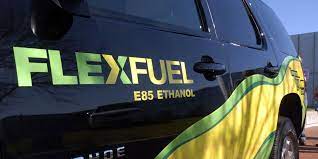The Union government is contemplating a request to decrease taxes on flex-fuel vehicles, a step that could expedite the transition towards cleaner transportation.
The Ministry of Heavy Industries and the Ministry of Road Transport and Highways are engaging with stakeholders and might propose a rationalization of the Goods and Services Tax (GST) on flex-fuel vehicles after consultations, as per two individuals familiar with the matter.
Subsequently, a final proposal by the Finance Ministry would be presented to the GST Council for approval, they added.
Flex-fuel vehicles are equipped with internal combustion engines but are designed to operate on more than one fuel. They are primarily intended to run on biofuels like ethanol and methanol or a combination of biofuels and conventional fuels. The 10% ethanol-blended petrol currently available in the country does not necessitate flex-fuel vehicles, but higher blends would.
The Ministry of Road Transport has been urging automakers to produce flex-fuel vehicles as the government aims to promote the use of cleaner fuels, with the goal of reducing reliance on oil imports.
“One of the two individuals mentioned above stated, “The ministries have received numerous industry representations seeking a reduction in GST, which currently stands at 28%. The industry is concerned that both the high GST and compensation cess could impede the adoption of these environmentally friendly vehicles.”
The second person mentioned that discussions are ongoing, and consensus has yet to be reached as some stakeholders oppose GST rationalization for flex-fuel vehicles. “Once the discussions are concluded, a final decision on submitting the proposal for a rate cut to the Finance Ministry will be made,” this person added.
The Ministries of Heavy Industries and Road Transport and Highways did not respond immediately to queries on the matter.
Flex-fuel vehicles currently attract a GST of 28%, similar to conventional internal combustion engine-based vehicles, while electric vehicles are taxed at 5%.
Industry bodies have urged for parity in tax rates between flex-fuel and electric vehicles.
In December 2021, the government advised automakers in India to commence manufacturing flex-fuel vehicles and flex-fuel strong hybrid electric vehicles, complying with BS-6 norms. Electrified flex-fuel vehicles offer the option of advanced batteries alongside flex-fuel engines.
Nitin Gadkari, the Union Minister for Road Transport and Highways, had stated that in alignment with the government’s vision to curtail crude oil imports and its policy on promoting ethanol as a transport fuel, guidelines for the utilization and development of flex-fuel engines and vehicles would be formulated. However, the segment has yet to gain traction. In August, Toyota Kirloskar Motor unveiled a prototype of the world’s first BS 6 (Stage II) electrified flex-fuel vehicle.
The promotion of biofuels and flex-fuel vehicles coincides with the government’s emphasis on promoting electric vehicles as it aims for a net-zero target by 2070, with decarbonization of mobility being a crucial requirement to reduce overall carbon emissions.
To expedite the introduction of flex-fuel vehicles, the government has included automobiles and auto components for flex-fuel engines in its Production-Linked Incentives (PLI) scheme.
Under the ethanol-blending program, all petrol pumps in the country currently dispense 10% ethanol-blended petrol. The objective is to transition to 20% ethanol-blended petrol by 2025.
It is anticipated that higher ethanol percentages will be blended into petrol in the next five years, necessitating the widespread availability of flex-engine vehicles.


